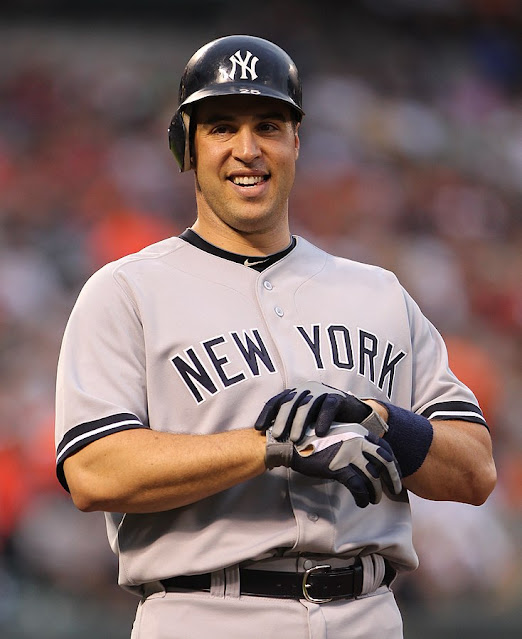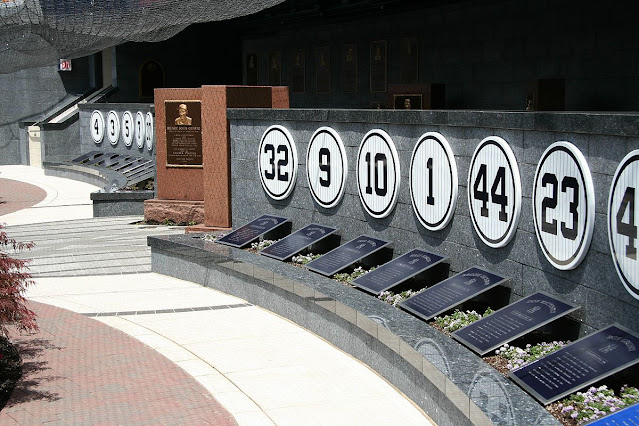Yankees on the 2022 BBWAA Hall of Fame Ballot - Those with a Hard Row to Hoe
After the small committee elections this past fall, the Baseball Hall of Fame will welcome six new - and long overdue - members next year. The more traditional BBWAA election is happening currently which could potentially add to that class. There are some players on this year's ballot who have come tantalizingly close to election in recent years and are looking at their last shot at enshrinement through the BBWAA. From a pure baseball perspective, these players would have been elected long ago, but suspected PED use and/or public controversies have kept Barry Bonds, Roger Clemens and Curt Schilling out of Cooperstown thus far. Joining them this year for the first time is Alex Rodriguez, who is likely to suffer the same fate as the aforementioned trio. More to come on his case in a future post.
In the meantime, we'll cover some other former Yankees present on the ballot. Joining Rodriguez as a first-timer on the ballot is Mark Teixeira, who spent the majority of his career in pinstripes. More transient Yankees Bobby Abreu and Andruw Jones are making their third and fifth appearance, respectively. Each of these players were considered legitimate stars in their prime, but none of them has a clear path to enshrinement. We'll dissect the case for each and assess the likelihood of them ever reaching the Hall of Fame, or if they'll even stay on the ballot next year. Players need to get at least 5% of the vote in order to remain on the ballot the following year.
As in past years, the JAWS (Jaffe Average WAR Score, developed by Jay Jaffe) value for the player is given in addition to the the average Hall of Famer's JAWS at the player's position. JAWS is a Hall of Fame rating system based on WAR that incorporates both career and peak value. If you're interested in learning more about this, click here.
Mark Teixeira - First Baseman, JAWS: 44.3, HoF JAWS: 54.2
When you think of a first baseman prototype, somebody like Mark Teixeira comes to mind. He was built like a linebacker, could consistently draw walks and hit home runs, and was as surehanded as they come in the field. As an added bonus, he was a switch hitter adept at inflicting damage from either side of the plate. Naturally, he was considered one of the best first basemen in baseball for an extended period during his career.
In just his second season with the Texas Rangers, Teixeira became the centerpiece of one of the most high-powered offenses in baseball in 2004. He followed that up with a monster year that included career highs in home runs with 43 and RBI's with 144, and earned him a first class ticket to baseball stardom.
As a testament to his reputation, Teixeira was the hottest trade commodity on the market in back-to-back years in 2007 and 2008. First, he was traded to Atlanta for top prospects as the Braves made an unsuccessful playoff push. When they entered full re-build mode the following year, he was sent packing to the Angels who succeeded in their playoff run. In those two seasons he posted the best OPS+ values of his career. He also showed that he could deliver in the playoffs as he hit .467 in a losing cause during the 2008 Division Series against the Red Sox. The stage couldn't have been set better for the free agent to be.
After missing the playoffs for the first time in over a decade, the Yankees were ready to shell out top dollar for the best players on the market in 2008. That included Teixeira, who cashed in on his recent success for $180 million over eight years. He lived up to his mega-deal right away, leading the AL in home runs and RBI's while pacing the Yankees offense as they made a successful World Series run in 2009.
The honeymoon didn't last long as Teixeira started a long, slow decline in 2010. As is the case with most mere mortals, it started with a decline in batting average, then injuries started to mount. In addition to keeping him out of action with regularity, it also robbed him of some power with the bat and reduced his already limited range in the field. During his last seven seasons in New York he never came particularly close to playing in another World Series and got by more on reputation than actual production.
Given that lengthy decline, Teixeira's Hall of Fame case is a tough one to make. While he was an elite first baseman for about a six year period, he was never really considered one of the five or even ten best players in baseball during that time. That still might have been acceptable had he extended his prime by another few years. Instead, he had exactly one great season after age 29, and even then he missed about 50 games due to injury.
It's still too early to say definitively, but it's looking an awful lot like this will be a one-and-done year for Teixeira on the ballot. Of the 90 voters who have made their choices public so far, only 1 has included Tex.
Bobby Abreu - Right Fielder, JAWS: 50.9, HoF JAWS: 56.7
For about a decade, Bobby Abreu was a metronome of baseball excellence. Every year he would hit .300 with 20 or 30 home runs, steal 20 or 30 bases, smack 40 doubles, score 100 runs, drive in 100 runs, and walk 100 times. Early in his career he was also a terrific fielder. Under normal circumstances this would make for a compelling Hall of Fame case.
However, Abreu was and still is rarely recognized as the great player he was during his career. This is almost solely attributable to his reserved nature that kept his demeanor low key no matter the situation on the baseball diamond. Fans and media members mistook his stoicism as a lack of passion or enthusiasm for baseball.
Truth is, nobody could be that productive for that long as a major leaguer while lacking passion for the game. From day one, Abreu took a sober, patient approach to hitting that made him an on-base machine but lacked the aggression that many around baseball crave. Productive as he was, he couldn't win over fans, especially in a city with a rabid fanbase like Philadelphia where he spent most of his career. This despite his heavy involvement in the local community, as evidenced by his Roberto Clemente Award in 2004.
It didn't help that the Phillies were a middling team that never made the playoffs during Abreu's tenure there. A 2006 trade to the Yankees meant that he would get to play meaningful October baseball. Although the Yankees lost the two playoff series that Abreu appeared in for New York, he hit well in both of them with an even .300 batting average. Despite his reputation, he could perform in high pressure situations.
As a member of the Yankees Abreu's home run and walk totals dipped a bit even as a lefty in Yankee Stadium, but he still remained a quality bat in the middle of the lineup. After signing as a free agent with the Angels in 2009, his production steadily tapered off until he retired at 40 years old.
Based on merit alone, Abreu's career achievements should warrant serious consideration for Cooperstown. Unsurprisingly, the BBWAA voters disagree as he's garnered less than 10% of the vote in each of his first two years on the ballot. The results did improve marginally for him from year one to two and early indications show that marginal improvement may continue. Still, it's seeming likely that he'll never get serious consideration from the Baseball Hall of Fame electorate. And that's a shame.
Andruw Jones - Center Fielder, JAWS: 54.6, HoF JAWS: 58.2
The Hall of Fame case for Andruw Jones may have been doomed before it even started. As a young player he often drew comparisons to fellow center fielder Willie Mays, which ensured that no matter what he did he would fall short of expectations. What he did though, was pretty damn impressive.
Any conversation about Jones should always start with his supreme fielding ability. At 6-foot-1 and 225 pounds he had astonishing range for a big man with an arm that could gun down runners from anywhere in the outfield. Per Baseball Reference's Runs from Fielding metric, he is by far the greatest player to patrol the outfield in baseball history, and fifth all-time at any position. This would appear to be no fluke as he earned 10 straight Gold Gloves from 1998 through 2007 in support of some all-time great pitching staffs for the Atlanta Braves.
Jones still had his detractors. Some felt he played a lazy center field and could actually have been better. After all, he was not an effective fielder after age 30 and was banished strictly to corner outfield spots for the last four years of his career. However, it wasn't his fault that he made it look easy, and as a bigger than average center fielder who started his career at just 19 years old, his body simply broke down in his 30's. Jones was truly one of the great ones in his day.
When it came to hitting, Jones was no slouch. With power uncharacteristic of a center fielder, he maintained a very productive bat for an extended period. From age 21 through 29 his average season included a .270/.347/.513 slash line, a 118 OPS+, 35 home runs, 104 RBI's, and 99 runs scored. This included a major league-leading 51 home runs in 2005. For his career he hit over 400 home runs and both scored and drove in over 1,200 runs. That puts him in rare company among center fielders all-time.
For the last five years of his career, Jones was nothing more than a power bat off the bench. This included a successful season as a reserve for the Yankees in 2011 where he put up an OPS+ of 126. Still, it was a far cry from the player he had been, and five years is a long time for writers to see a once great player deteriorate into a lesser one. After a dismal 2012 season with the Yankees he would never play in the major leagues again.
Thanks to the perceived laziness and long, slow, painful decline to end his career - a 2012 domestic violence incident couldn't have helped things either - Jones got very little support in his first two years on the Hall of Fame ballot. Yet over the last two years a less crowded ballot seems to have significantly helped him in the polls. He secured nearly 20% of the vote in 2019 after a previous high of 7.5% and improved to over 33% last year. There's a long way to go, but with five years of eligibility left, we may see one of the greatest fielders ever enshrined in Cooperstown before long.



.jpg)


Comments
Post a Comment